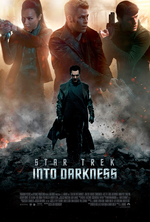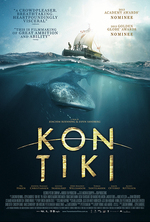Film Screening 3rd August, 2013

Star Trek Into Darkness
7:00 PM, 3rd August, 2013
No Guests
- M
- 132 mins
- 2013
- J.J. Abrams
- Roberto Orci, Alex Kurtzman, Damon Lindelof
- Chris Pine, Zachary Quinto, Zoe Saldana, Benedict Cumberbatch
The trouble with making a movie about how Captain Kirk came to be Captain of the Enterprise is that there is a total of 333 hours of television footage, and 19 hours of movie footage, showing everything that happened after he became captain. The weight of all that future history would crush the excitement out of any story. While “Star Trek” fans may have been eager to watch actors trudge fatalistically into position, I doubt anyone else was. Which is why I love the way J.J. Abrams calmly cut the Gordian Knot at the start of the first movie – sending us all into unfamiliar territory, and making all the familiar characters suddenly seem brand new.
Now we head a little further into the unknown – into darkness. After a sunshiny action set piece on one of the most beautifully realised alien planets you’ve ever seen (the cause? That damned Prime Directive once again clashes with common sense – whose stupid idea was it, anyway?), we somehow find ourselves heading out the edge of Klingon territory, on a covert mission after an icy villain (played by the frozen-veined Cumberbatch). In the interests of preserving the sense of off-balanceness Abrams wants I can’t reveal much more. Suffice it to say there’s a nice symmetry of Spock learning to be more like Kirk, while Kirk learns to be more like Spock. That’s the real drama of the Star Trek universe, anyway.
Henry Fitzgerald

Kon-Tiki
9:27 PM, 3rd August, 2013
- M
- 113 mins
- 2012
- Joachim Rønning, Espen Sandberg
- Petter Skavlan
- Pål Sverre Hagen, Anders Baasmo Christiansen, Gustaf Skarsgård, Odd-Magnus Williamson
If you’re kind of vague on where Polynesia is, that’s because it’s not really a place: it’s a very scattered collection of Pacific islands with nothing in particular in common except that they were discovered and first settled by the Polynesians. And who were they? The prevailing view in the 1940s was that they came from South-East Asia, settling the Pacific from west to east. But Norwegian anthropologist Thor Heyerdahl had the opposite idea: he thought Polynesia settled from east to west, starting in Peru. This would have involved crossing thousands of kilometres of open ocean on nothing more seaworthy than a lashed-together raft – so Heyerdahl, and a bunch of good-natured amateurs, lashed together their own raft (the Kon-Tiki), and triumphantly proved it could be done.
Their voyage is now the subject of a movie from a pair of directors who seem to be specialising in Norwegian national heroes (their last was Max Manus, 2010). It’s the story of an international crew learning to trust one another, and is much more gripping than a story about people passively floating across the sea has any right to be.
But I have to point out: just before the final credits, we get the usual biographical stuff, telling us what happened next to these people. What I thought they’d mention – but they didn’t – was that the Polynesians were of Asian origin; they sailed west to east, just as everyone in the 1940s had thought. Heyerdahl risked his life in the service of a theory that was completely wrong. But I think this knowledge only makes the film’s ending more agreeably bittersweet.
Henry Fitzgerald